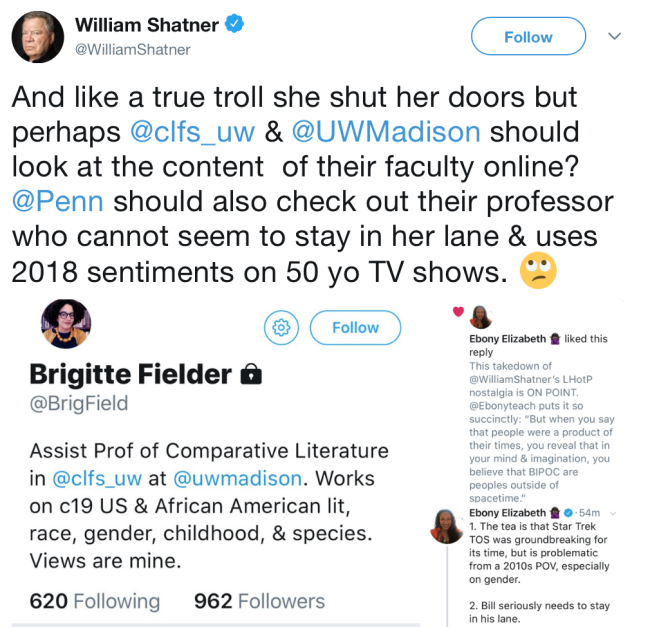You have /5 articles left.
Sign up for a free account or log in.

William Shatner, Star Trek’s original Captain Kirk, wasn’t exactly telling academics on Twitter to live long and prosper this week when he dived into the ongoing controversy over the former Laura Ingalls Wilder Award. (He might have done well to summon his inner Mr. Spock, however.)
In a series of tweets, Shatner criticized the Association for Library Service to Children's June decision to change the name of the Laura Ingalls Wilder Award for significant contributions to youth literature to the Children’s Literature Legacy Award. The children's librarians group, which is a part of the greater American Library Association, has said it based its decision on “the fact that Wilder’s legacy, as represented by her body of work, includes expressions of stereotypical attitudes inconsistent” with its “core values of inclusiveness, integrity and respect, and responsiveness.”
The Little House books were published starting 1932. Wilder received the inaugural children’s literature award in 1954. Since that time, concerns have emerged about Wilder's portrayal of black people and especially Native Americans. The books’ nearly all-white characters sometimes comment that the only “good Indian is a dead Indian,” for example. For those reasons, many have applauded the award name change as an important acknowledgment that Wilder’s descriptions perpetuate hurtful stereotypes.
Others have accused the association of censorship. Critics say it’s unfair to apply contemporary norms to historical works and that even ugly truths present teaching moments. Joining them, Shatner tweeted, “Did you hear about the Laura Ingalls Wilder Award being renamed over negative lines on the indigenous people of America?” Shatner added, “I find it disturbing that some take modern opinion & obliterate the past. Isn’t progress @ learning from our mistakes?”
The tweet gained its own variety of responses, with some circling into a debate about whether Star Trek itself was progressive or racist -- or both. Shatner continued to defend his position on Wilder while some academics criticized it. Among them were Brigitte Fielder, an assistant professor of comparative literature at the University of Wisconsin at Madison, and Ebony Elizabeth Thomas, an associate professor of education at the University of Pennsylvania.
Fielder has since made her account private, gaining rebuke from Shatner, who called her a “troll.” But Thomas has kept public her account, including tweets saying that Star Trek was “groundbreaking for its time, but is problematic from a 2010s [point of view], especially on gender.” Shatner “seriously needs to stay in his lane,” she added. Thomas later commented that she'd earned tenure for her work on these kinds of issues. "This is my lane -- I have a book coming out in the spring on this very topic," she said.
Clearly perturbed, Shatner tweeted about both professors, tweeting at their institutions’ accounts in an apparent, nonironic request for censorship. “Perhaps @clfs_uw & @UWMadison should look at the content of their faculty online? @Penn should also check out their professor who cannot seem to stay in her lane & uses 2018 sentiments on 50 yo TV shows,” he wrote.
Shatner’s tweet prompted Ari Cohn, a lawyer with the Foundation for Individual Rights in Education, to chide him and warn both Penn and Wisconsin not to take up Shatner's idea. If “either university tries to police the content of faculty's speech because you were offended (side note: criticizing your show and your views is not ‘debasing’ or ‘making fun of’ you, it's mere criticism; grow up),” Cohn wrote, “they are going into a much bigger thorn than you. Namely, me.”
Fielder said via email Thursday that she is "invested in antiracist pedagogical practices" for teaching Little House on the Prairie in her own classes. So she's "familiar with the racist content of these books and the longstanding objections to them.”
She said she'd entered the conversation about Shatner to reply to a tweet about "a common (and historically false) argument: that past racism ought not to be judged by ‘modern' standards of opposing racism because racism was not objectionable at the time.” As a scholar of U.S. literature from the 1800s, she added, "I know that there have always been people objecting to racism, even when those people were not in the majority."
So far, Fielder said she’s heard nothing about an investigation but has received support from colleagues. The American Association of University Professors’ advocacy chapter at Wisconsin's Milwaukee campus supported her online, tweeting that Shatner had spent July 4 implying that its administration and Penn’s “should consider firing 2 kid lit professors for disagreeing with him about whether it's appropriate to note racism in Little House [on] the Prairie.”
As Shatner continued to tweet about her -- saying, for example, that she had just gained tenure while he was a published author a dozen times -- Thomas shared a photo of herself sipping a beer. In later tweets, she said that while such an incident might have “devastated” her career 10 or 15 years ago, she’s fine today.
“As long as I'm not physically threatened, let people talk,” she said. “I went through so much earning my Ph.D. and trying to make tenure that Grandma's prayers were answered. Skin's tough. This is nothing. If I lose my job over this, or my institution investigates me, I'll just be on the market."
Penn said it had “nothing to offer" about the matter.









